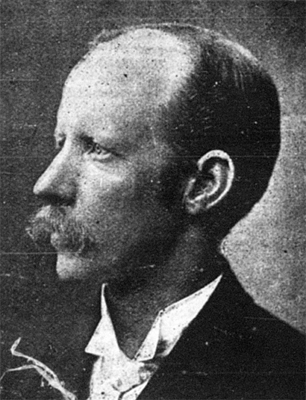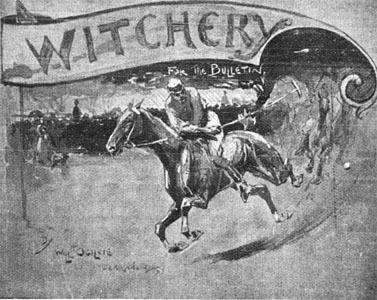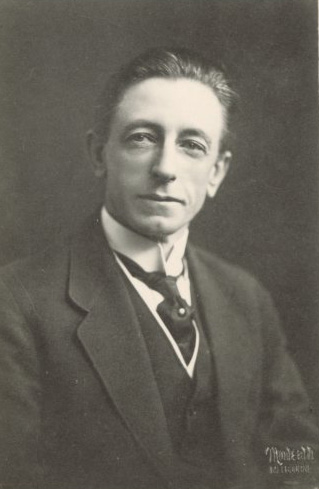On Nungar the mists of the morning hung low,
The beetle-browed hills brooded silent and black,
Not yet warmed to life by the sun's loving glow,
As through the tall tussocks rode young Charlie Mac.
What cared he for mists at the dawning of day,
What cared he that over the valley stern 'Jack',
The monarch of frost, held his pitiless sway? -
A bold mountaineer, born and bred, was young Mac.
A galloping son of a galloping sire -
Stiffest fence, roughest ground, never took him aback;
With his father's cool judgement, his dash and his fire,
The pick of Monaro, rode young Charlie Mac.
And the pick of the stable the mare he bestrode -
Arab-grey, built to stay, lithe of limb, deep of chest,
She seemed to be happy to bear such a load
As she tossed the soft forelock that curled on her crest.
They crossed Nungar Creek, where its span is but short
At its head, where together spring two mountain rills,
When a mob of wild horses sprang up with a snort -
'By thunder!' quoth Mac, 'there's the Lord of the Hills.'
Decoyed from her paddock, a Murray-bred mare
Had fled to the hills with a warrigal band.
A pretty bay foal had been born to her there,
Whose veins held the very best blood in the land -
'The Lord of the Hills', as the bold mountain men,
Whose courage and skill he was wont to defy,
Had named him; they yarded him once, but since then
He'd held to the saying 'Once bitten twice shy.'
The scrubber, thus suddenly roused from his lair,
Struck straight for the timber with fear in his heart;
As Charlie rose up in his stirrups, the mare
Sprang forward, no need to tell Empress to start.
She laid to the chase just as soon as she felt
Her rider's skilled touch, light, yet firm, on the rein.
Stride for stride, lengthened wide, for the green timber belt,
The fastest half-mile ever done on the plain.
They reached the low sallee before he could wheel
The warrigal mob; up they dashed with a stir
Of low branches and undergrowth - Charlie could feel
His mare catch her breath on the side of the spur
That steeply slopes up till it meets the bald cone.
'Twas here on the range that the trouble began,
For a slip on the sidling, a loose rolling stone,
And the chase would be done; but the bay in the van
And the little grey mare were a surefooted pair.
He looked once around as she crept to his heel
And the swish that he gave his long tail in the air
Seemed to say, 'Here's a foeman well worthy my steel.'
They raced to within half a mile of the bluff
That drops to the river, the squadron strung out.
"I wonder," quoth Mac, "has the bay had enough?"
But he was not left very much longer in doubt,
For the Lord of the Hills struck a spur for the flat
And followed it, leaving his mob, mares and all,
While Empress (brave heart, she could climb like a cat)
Down the stony descent raced with never a fall.
Once down on the level 'twas galloping-ground,
For a while Charlie thought he might yard the big bay
At his uncle's out-station, but no! He wheeled round
And down the sharp dip to the Gulf made his way.
Betwixt those twin portals, that, towering high
And backwardly sloping in watchfulness, lift
Their smooth grassy summits towards the far sky,
The course of the clear Murrumbidgee runs swift;
No time then to seek where the crossing might be,
It was in at one side and out where you could,
But fear never dwelt in the hearts of those three
Who emerged from the shade of the low muzzle-wood.
Once more did the Lord of the Hills strike a line
Up the side of the range, and once more he looked back,
So close were they now he could see the sun shine
In the bold grey eyes flashing of young Charlie Mac.
He saw little Empress, stretched out like a hound
On the trail of its quarry, the pick of the pack,
With ne'er-tiring stride, and his heart gave a bound
As he saw the lithe stockwhip of young Charlie Mac
Showing snaky and black on the neck of the mare
In three hanging coils with a turn round the wrist.
And he heartily wished himself back in his lair
'Mid the tall tussocks beaded with chill morning mist.
Then he fancied the straight mountain-ashes, the gums
And the wattles all mocked him and whispered, "You lack
The speed to avert cruel capture, that comes
To the warrigal fancied by young Charlie Mac,
For he'll yard you, and rope you, and then you'll be stuck
In the crush, while his saddle is girthed to your back.
Then out in the open, and there you may buck
Till you break your bold heart, but you'll never throw Mac!"
The Lord of the Hills at the thought felt the sweat
Break over the smooth summer gloss of his hide.
He spurted his utmost to leave her, but yet
The Empress crept up to him, stride upon stride.
No need to say Charlie was riding her now,
Yet still for all that he had something in hand,
With here a sharp stoop to avoid a low bough,
Or a quick rise and fall as a tree-trunk they spanned.
In his terror the brumby struck down the rough falls
T'wards Yiack, with fierce disregard for his neck -
'Tis useless, he finds, for the mare overhauls
Hi slowly, no timber could keep her in check.
There's a narrow-beat pathway that winds to and fro
Down the deeps of the gully, half hid from the day,
There's a turn in the track, where the hop-bushes grow
And hide the grey granite that crosses the way
While sharp swerves the path round the boulder's broad base -
And now the last scene in the drama is played:
As the Lord of the Hills, with the mare in full chase,
Swept towards it, but, ere his long stride could be stayed,
With a gathered momentum that gave not a chance
Of escape, and a shuddering, sickening shock,
He struck on the granite that barred his advance
And sobbed out his life at the foot of the rock.
Then Charlie pulled off with a twitch on the rein,
And an answering spring from his surefooted mount,
One might say, unscathed, though a crimsoning stain
Marked the graze of the granite, but that would ne'er count
With Charlie, who speedily sprang to the earth
To ease the mare's burden, his deft-fingered hand
Unslackened her surcingle, loosened tight girth,
And cleansed with a tussock the spur's ruddy brand.
There he lay by the rock - drooping head, glazing eye,
Strong limbs stilled for ever; no more would he fear
The tread of a horseman, no more would he fly
Through the hills with his harem in rapid career,
The pick of the Mountain Mob, bays, greys, or roans.
He proved by his death that the place 'tis that kills,
And a sun-shrunken hide o'er a few whitened bones
Marks the last resting-place of the Lord of the Hills.
First published in
The Bulletin, 30 May 1891
and later in
Where the Dead Men Lie and Other Poems by Barcroft Boake, 1897;
Old Ballads from the Bush edited by Bill Scott, 1987;
A Collection of Australian Bush Verse, 1989;
Barcroft Henry Boake edited by Hugh Capel, 2002;
Where the Dead Men Lie: The Story of Barcroft Boake, Bush Poet of the Monaro: 1866-1892 by Hugh Capel, 2002;
Barcroft Boake: Collected Works, Edited, with a Life edited by W. F. Refshauge, 2007; and
Two Centuries of Australian Poetry edited by Kathrine Bell, 2007.
Author reference sites: Austlit,
Australian Dictionary of Biography,
Australian Poetry LibrarySee
also.



